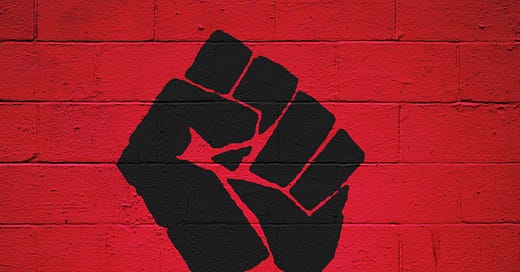Communism Explained Simply (Minus the Cold War Panic)
A No-Bullshit Guide to What Communism Actually Is (And Isn’t)
I don’t know how to gently say that the solution to kids dying in factories isn’t kids starving in famines—but here we are.
I’ve got a running Resource Library for posts like this, including Communism Decoded.
Lately, I’ve noticed a wave of people treating communism like it’s some super chill solution to our messy, late-stage capitalism (spoiler: it’s not). And it’s not even just my own bias speaking (though, full disclosure, I do have one)—it’s that a whole lot of people romanticizing communism don’t seem to understand what it actually is or what happens whenever someone tries it.
People aren’t even arguing about the same thing. For some, “communism” means authoritarian nightmares like Stalin’s USSR. For others, it’s universal healthcare, strong unions, or literally just hating their boss. It's a mess.
So let’s clear this up:
Communism isn’t when everyone makes the exact same amount of money. That was never even the point.
It’s also not “everyone gets exactly the same stuff.” I’ll explain why in a bit.
And no, it’s definitely not whatever Republicans think happens at liberal arts colleges.
Communism, in its simplest form, proposes that the "means of production"—stuff like factories, farms, and major resources—should be owned collectively by the people who actually do the work. The key word here is "proposes," because no country has ever managed to successfully achieve this without catastrophic consequences.
Sure, it sounds great, but every idealistic theory looks good on paper when you conveniently leave out every historical context that proves otherwise.
Note: Democratic socialist countries (like those in Scandinavia) aren't communist. They retain private property, markets, and democracy.
What Even Is Communism, Then, Bitch?
Communism is not some impossibly complex economic theory—no matter what the weird podcast bros say. At its core, communism is simply a critique of who owns stuff, who makes stuff, and who profits from said stuff. That’s it. All the philosophy, revolution fantasies, and historical drama comes after that basic point.
Let me put it into perspective:
Imagine existence as one giant group project (it basically is). Your assignment: everyone must put in exactly the same amount of effort, or everyone fails. Oh, and you don’t get individual credit, either.
Now picture that one girl—the one you can’t stand because she’s always right, always loud, always has to be the center of attention. You know exactly who I'm talking about. But imagine there’s not just one of her—there’s an entire community. And your job is to somehow convince all of them that they're not special, they're not smarter, and they're not entitled to more, or else the entire project crashes and burns.
So, what happens next? Either the whole thing collapses, or someone grabs control and forces everyone into line.
Cue the inevitable rise of an authoritarian figure.
Alright, Alright, Give Me the TLDR of the Rest of It.
Karl Marx was a German philosopher whose ideas critically analyzed societal inequalities. However, violent and oppressive regimes later justified horrific actions using distorted interpretations of his ideas.
So, anyway, Marx looked around at factory workers in the 1800s and said "this is messed up." And it was, for sure.. People were dying in factories while factory owners got rich. Children were working 16-hour days. Nobody had any rights at work. The air was literally brown from pollution. It sucked. More than right now sucks for most people. Which reminds me, next topic: recency bias.
Lets Talk About Where It All Falls Apart
Humans like having more stuff than other humans. We're competitive. We're weird about status. We collect things. We want the slightly better apartment, the cooler clothes, the newer phone. Communism pretends this isn't true. Even if it's untrue for you, it's true for the majority. Historically, attempts to eliminate these entirely have consistently faced fierce resistance.
That means that a communist country has to figure out who decides what everybody gets. Surprise: it's always some government official who's never met you but somehow knows exactly what you "need." And they're usually living way better than everyone else while they do it.
This has happened everywhere that it has been tried. The USSR? Collapsed. China? Only started working when they brought back private property and markets. Cambodia? Genocide. North Korea? A literal dynastic dictatorship with nukes. Cuba? People float to Florida on rafts made of trash to escape.
Yes, I know these are extreme examples—but if every real-world attempt ends in collapse, corruption, or control, maybe it’s the structure, not just the people.
The Flip Side
Saying "communism failed" doesn't make the problems it was trying to solve go away. People are still mad about the same basic issues Marx was mad about - they're just in modern forms.
Instead of dangerous factories, we have burnout and toxic work culture. Instead of child labor in coal mines, we have unpaid internships and endless student debt. Instead of industrial barons, we have tech billionaires. Different aesthetics, same problems.
This is why communism keeps coming up in different forms. Not because the internet suddenly discovered Das Kapital between apocalyptic headlines - because people are looking at the economic reality of things and thinking "this isn't working."
The solution, however, is never a different flavor of authoritarianism.
Next week: Socialism, and why Americans are so weird about it. Spoiler alert: it's not because of the policies.
Drop a comment if you want to learn about other political ideologies that everyone overcomplicates.
I take requests, and apparently I'll even explain anarcho-capitalism if enough people ask nicely.
Your Friends at ICYDAK



